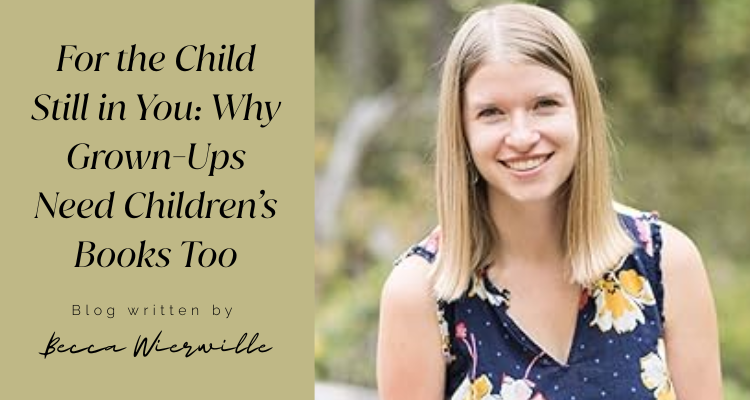
For the Child Still in You: Why Grown-Ups Need Children’s Books Too
As an author of chapter books and middle grade novels, I often get the question, “What ages are your books written for?”
Usually, I’ll say something like, “They’re written for kids ages seven to thirteen, but I’ve had teenagers and adults enjoy them too—as long as you don’t mind reading stories about twelve-year-olds!”
I’ll admit I’m probably a bit biased as a children’s author, but I love reading “kidlit,” as we affectionately call children’s literature—from picture books through young adult. And I believe enjoying some kidlit along with our other preferred genres can enrich our reading lives as adults.
Here’s why:
- Children’s fiction carries powerful messages in simple ways.
- Children’s fiction can renew our sense of wonder and imagination.
- Children’s fiction can help us understand kids better—and remember what it was like to be kids ourselves.
- Children’s fiction provides hope.
- Children’s fiction is often masterfully written.
While I could go on, I’ll focus on these five points today, starting with the fact that children’s fiction can convey powerful messages in simple language.
Now, I’m not saying that kidlit should be preachy. Kids can spot a “preachy” story within the first few pages. They’re coming to a fiction story for a fun adventure and to escape to a new world, not to seek out some sort of moral lesson.
But within that fun adventure, these fictional tales often hold timeless truths. The importance of courage, the beauty of friendship, the rewarding but challenging process of forgiveness. Each of the books in my Road Trip Rescue series features the theme of forgiveness, not just in a sense that it’s good to forgive, but showing that forgiveness is challenging. It’s an ongoing process, but it’s worth it. Seeing these lessons learned through the eyes of a child has a different impact than reading about it in a nonfiction self-help book.
Books for kids can also rekindle childlike wonder in our own lives. As adults, we are often caught in the routine of daily life, forgetting what it was like to spend our days playing and creating. Stories about talking animals, kid heroes, and unlikely adventures can spark our imaginations and encourage us to be curious again—like we were when we were kids.
For those of us who are parents, teachers, aunts, uncles, or have kids in our lives in some other capacity, reading children’s books can help us connect with them. When we read a book written from the perspective of a ten-year-old, we are invited into that character’s thoughts and feelings. We see how they process the world. We can reconnect with how we might’ve gone through at that age. By reading what our kids are reading, we can start to understand them better.
And that’s not to mention the hope most children’s books provide. Many books for kids—especially picture books through middle grade novels—end on a note of hope. The characters have gone through challenges, but we see that hope is not lost.
In Christian kidlit, that hope points us back to Jesus. When we’re going through hard seasons, it can be hard to read a heavy novel or even a news article and not feel disheartened. But children’s fiction reminds us that good can still win—and in the best stories, that God is with us, that He is good, and that He is our constant hope.
Despite these things—powerful messages, a renewed sense of wonder, the gift of understanding kids better, and hope—some adults might still hesitate to read kids’ books because they feel…well…elementary. Can a five-hundred-word picture book written for kids have the same richness and deep emotional resonance as a one-hundred-thousand-word literary fiction novel?
My answer to this, without hesitation, is yes.
Not all children’s books are well-written, just like not all books for adults are well-written. But so many children’s authors are masterful storytellers, weaving deep stories that hold meaning in each word. The books in my Road Trip Rescue series are around forty thousand words each, and I have immense respect for those authors who craft compelling stories with far fewer words.
Writing fiction for kids is not easier—but it’s worth it. Both for the kids who read them, and for the adults who give them a chance.
While I could go on, those are a few reasons I believe children’s fiction can enrich our lives. As adults, we’ll take away different things from these books than their intended audience. Still, we’ll be able to connect again with our inner child as these stories remind us of powerful truths, encourage our imaginations, and bring us hope.




